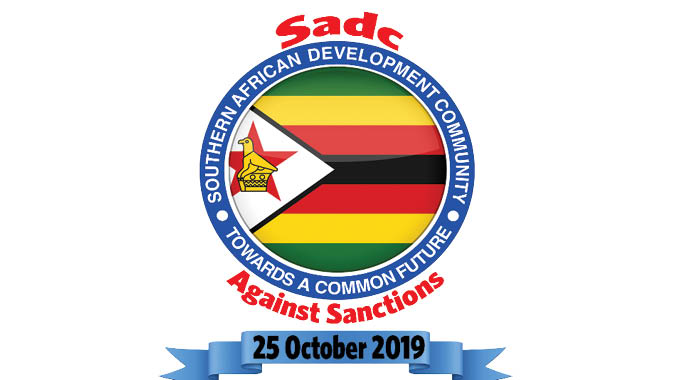EDITORIAL COMMENT: West can assist Zimbabwe by totally lifting sanctions

WHEN the United States Congress passed The Zimbabwe Democracy and Economic Recovery Act in 2001, it imposed economic sanctions on Zimbabwe following the footsteps of the European Union, Australia and New Zealand and Canada. The Act allegedly provided for a “transition to democracy and the promotion of economic recovery”.
But contrary to the stated mission of the piece of legislation, ZDERA has unleashed untold misery on the people of Zimbabwe as it has hamstrung efforts by Government to resuscitate the economy. In fact, the law is the single biggest assault on the economy and by passing that legislation, US lawmakers (in both Congress and the Senate), it can be argued, waged economic terrorism on tiny Zimbabwe. Record shows that Senators Bill Frist (Republican) and Russ Feingold (Democrat) introduced the bill on March 8, 2001. Senators Frist, Jesse Helms (Republican), Hillary Clinton (Democrat), and Joseph Biden (Democrat) sponsored the bill.
The Senate passed the bill on August 1 and the House of Representatives (Congress) passed the bill on December 4. President George W Bush signed it into law on December 21. ZDERA’s policy was stated to “support the people of Zimbabwe in their struggle to effect peaceful, democratic change, achieve broad-based and equitable economic growth, and restore the rule of law.”
Consequent to the enactment of the law, the Government of Zimbabwe was unable to participate in programmes created by the International Bank for Reconstruction and Development and International Monetary Fund to assist in the transformation and resuscitation of Zimbabwe’s economy.
The IMF suspended support under a “Standby Arrangement” in September 1999 that was approved in August 1999 for economic adjustment and reform. In October 1999, all structural loans, credits, and guarantees to the Government of Zimbabwe were suspended from the International Development Association (IDA). This was followed by a complete suspension of new lending to the Government of Zimbabwe by the IDA in May 2000. By September 2000, the IDA suspended all funds to the Government of Zimbabwe for ongoing projects.
In addition, the US Secretary of the Treasury instructed the US executive director of each international financial institution to “oppose and vote against” any extension by the respective institution of any loan credit, or guarantee to the Government of Zimbabwe and any cancellation or reduction of indebtedness owed by the Government of Zimbabwe to the United States or any international financial institution.
As Zimbabwe prepares to mark Anti-Sanctions Day on Friday, it is trite to note the impact of the embargo on the country. A study commissioned by the Ministry of Foreign Affairs and International Trade estimates that the country could have lost over US$42 billion in revenue over the past 18 years. While the EU has lifted most of the punitive measures it imposed on Zimbabwe, the US has maintained them with devastating effects on the economy.
US democratic Senator Chris Coons, who together with Sen Jeff Flake are among the foremost supporters of ZDERA, has conceded that the sanctions are hurting the economy of Zimbabwe. In May 2018, he said: “But as long as there are significant sanctions by Western countries on Zimbabwe that raises both direct and indirect challenges for them. It makes it harder for them to access capital, to attract the sort of interest and engagement that would revive the Zimbabwean economy”.
Publicly, the US claims that sanctions are targeted at the ruling elite and some State-owned entities which pose a direct and extraordinary threat to the foreign policy of the US. However, records show that in December 2011, the US added private companies, Anjin and Marange Resources to the sanctions list.
In June 2012, it enforced ZDERA by shutting the door on diamonds from Marange and cutting off access to the world’s biggest jewellery market. In October 2013, the Industrial Development Corporation lost more than US$20 million to the US Office of Foreign Assets Control. In November 2013, Econet’s multi-million dollar operations were hamstrung by economic sanctions.
In January 2014, Standard Chartered Zimbabwe ordered IDC to close its bank account with the institution to comply with ZDERA. The Commercial Bank of Zimbabwe was in October 2017 slapped with a US$3,8 billion fine by the US Treasury for transactions done on behalf of ZB Bank.
Standard Chartered Zimbabwe was also fined US$18 million for processing 1 795 transactions totalling US$77 million for or on behalf of sanctions entities. Clearly, from the foregoing, it is utterly impossible for Zimbabwe to successfully turn around its economy while it has an albatross around its neck. We hope the ongoing anti-sanctions campaign being spearheaded by Sadc and the African Union will find traction and acceptance in Western capitals so that Zimbabwe is freed to determine its destiny.
There is no doubt that Zimbabwe needs access to cheap lines of credit to augment its economic blueprint and Vision 2030. It is time the US and other Western countries lifted sanctions in their totality to afford the country a chance to revive its economy.








Comments